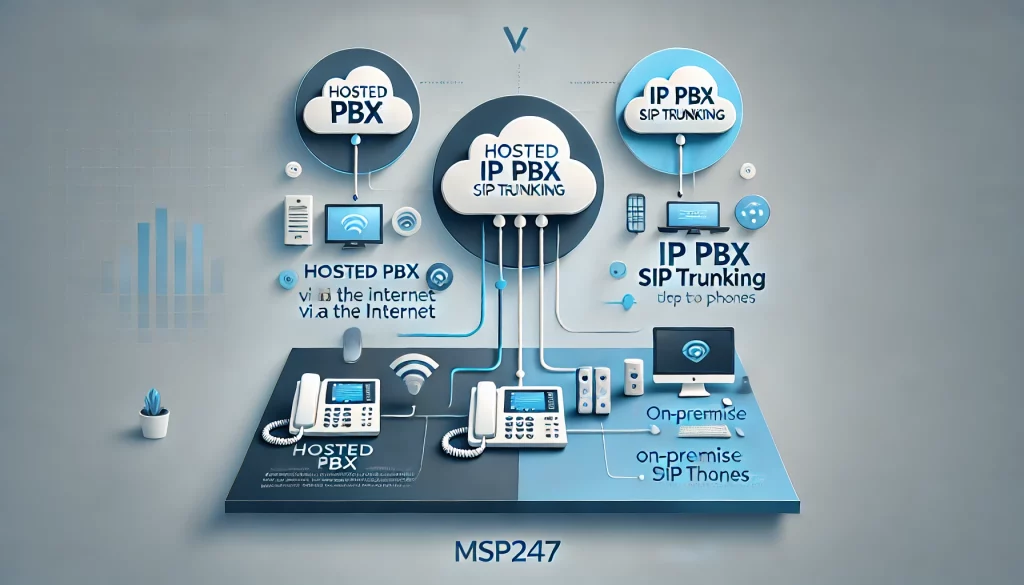VoIP Trunks (SIP Trunks) for Business | Reliable VoIP Solutions | MSP247
VoIP Trunks, also known as SIP Trunks, are an essential solution for businesses looking to modernize their communication systems. With the UK scheduled to shut down its traditional ISDN (Integrated Services Digital Network) lines by 2025, now is the ideal time for businesses to transition to a VoIP-based telephony system.
At MSP247, we provide cost-effective and reliable VoIP solutions tailored to meet the dynamic needs of businesses. By upgrading to VoIP Trunks, businesses can future-proof their communication systems, ensuring compliance with modern standards while enjoying enhanced flexibility, cost savings, and scalability.
This proactive shift not only prevents service disruption post-ISDN but also unlocks a range of advanced features that traditional systems cannot offer. Let MSP247 guide you through this vital transition with our expert support and tailored VoIP solutions.

What Are VoIP Trunks?
VoIP Trunks, or SIP Trunks, are digital lines that use the internet to transmit voice calls instead of traditional telephone lines. They are a vital part of any modern telephony infrastructure, enabling businesses to connect their Private Branch Exchange (PBX) systems to the global telephone network.
How Do VoIP Trunks Work?
VoIP Trunks leverage the SIP (Session Initiation Protocol) to establish, manage, and terminate voice and video calls. This technology integrates seamlessly with your existing PBX, enabling efficient communication by routing calls via high-speed internet instead of traditional ISDN lines.
Benefits of VoIP Trunks for Your Business
Cost-Effective
Save More with VoIP
Scalability
Grow Without Limits
Global Reach
Worldwide Connectivity
What Do You Need to Use VoIP Trunks?
To set up VoIP Trunks for your business, you need:
- Internet Connection: A stable and high-speed internet connection is crucial.
- Compatible PBX System: An on-premise or cloud-based PBX system.
- VoIP Service Provider: A trusted provider like MSP247 to ensure smooth implementation and ongoing support.
Schedule Your Free Consultation Today
Why Choose MSP247 for VoIP Trunks?
At MSP247, we specialize in delivering tailored VoIP Trunk solutions that align with your business goals. Here’s why businesses choose us:
![]() Expertise: Decades of experience in telecommunication services.
Expertise: Decades of experience in telecommunication services.
![]() Support: 24/7 customer support for uninterrupted communication.
Support: 24/7 customer support for uninterrupted communication.
![]() Custom Solutions: Plans tailored to your specific business needs.
Custom Solutions: Plans tailored to your specific business needs.
The must common questions our customers ask are below. If you cant see the answer to your question or you want more details, please Contact Us
What is a VoIP trunk?
A VoIP trunk is a communication channel that connects a business's phone system (PBX) to the internet. It allows voice calls, video calls, and data to be transmitted over IP networks rather than traditional phone lines, providing cost savings and scalability.
How does VoIP trunking work?
VoIP trunking works by converting analogue voice signals into digital packets that are transmitted over the internet using the SIP (Session Initiation Protocol). These packets are then routed to the destination, whether it's a phone, computer, or another PBX.
What’s the difference between VoIP trunks and traditional phone lines?
- VoIP trunks use the internet to transmit voice and data, offering flexibility and lower costs.
- Traditional phone lines use physical copper or ISDN lines, which are generally more expensive and less scalable.
What are the benefits of using VoIP trunks?
- Cost savings on local and international calls.
- Scalability to add or remove lines without physical installations.
- Integration with modern systems like CRM and unified communications.
- Advanced features like call forwarding, analytics, and disaster recovery.
What is SIP in VoIP trunking?
SIP (Session Initiation Protocol) is the protocol used in VoIP trunking to initiate, manage, and terminate voice and video calls over the internet. It’s a key component of VoIP that ensures calls are routed to the correct destination.
What internet speed is required for VoIP trunking?
VoIP calls require approximately 64 kbps per call for good quality. For a business expecting 20 concurrent calls, a minimum of 1.5 Mbps upload and download speed is recommended. Adding a buffer for other internet traffic is advisable.
Can I keep my existing phone number with VoIP trunking?
Yes, most VoIP providers offer number porting, which allows businesses to retain their existing phone numbers when switching to VoIP. The process can take a few days to complete.
How is call quality maintained with VoIP trunks?
Call quality is maintained using technologies such as:
- QoS (Quality of Service): Prioritizes voice traffic over other internet traffic.
- Codec selection: Using high-quality codecs like G.711 or G.729.
- Dedicated bandwidth: Ensuring sufficient internet speed for concurrent calls.
- Network monitoring: Identifying and resolving issues like jitter or packet loss.
Can VoIP trunks integrate with cloud-based PBX systems?
Yes, VoIP trunks can seamlessly integrate with cloud-based PBX systems. This setup offers flexibility, as businesses can manage their communication system remotely while using VoIP trunks to handle the voice traffic.
